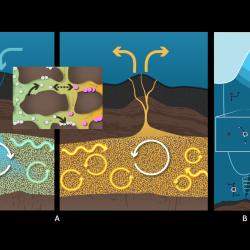UMD Astronomy Professor Derek Richardson Receives Kirwan Faculty Research and Scholarship Prize
The award recognizes Richardson’s breakthrough investigation into the internal structure of asteroids and comets
Derek Richardson could be called asteroid sharpshooter. After all, he is co-leading an effort to slam a spacecraft into a rocky moon the size of a football field. Oh, and the moon is a million kilometers away circling an asteroid that’s hurtling through space.

“It's a very, very tiny target, and we don't know a lot about it,” said Richardson, a University of Maryland Astronomy Professor and co-investigator of the NASA Double Asteroid Redirection Test (DART) mission, which aims to demonstrate that a small body in space could be intentionally deflected by a controlled impact.
The spacecraft is scheduled to launch in 2021 with impact projected for fall 2022. And if anyone is qualified to predict what will happen on impact and figure out what the moon is made of, it’s Richardson. As a computational astrophysicist, Richardson uses the laws of physics, mathematics and computer algorithms to predict and model the structure of small astronomical bodies such as comets and asteroids. In the last three years, he has authored or co-authored 30 peer-reviewed publications related to understanding and modeling the nature of these small bodies.
This fall, Richardson's accomplishments will be acknowledged with the university’s 2020 Kirwan Faculty Research and Scholarship Prize. The award, which includes a $5,000 stipend, recognizes Richardson’s “breakthrough investigation into the internal structure of asteroids and comets, both the theoretical investigation and the interpretation of observations and experiments.”
“Professor Richardson’s research and discoveries have made vital contributions to our understanding of the solar system,” said Amitabh Varshney, dean of UMD’s College of Computer, Mathematical, and Natural Sciences. “His work on the composition and dynamics of small bodies in space is helping inform missions to asteroids that will expand fundamental knowledge and protect Earth from potential impacts.”
The Kirwan Prize was established in 1999 in honor of UMD Mathematics Professor and Past President William E. Kirwan and his late wife, Patricia. Richardson is the first faculty member from the Department of Astronomy to receive this annual award. Richardson will receive the award at the university’s Faculty and Staff Convocation on October 14, 2020.
“I was very honored to learn that I am being given this award,” Richardson said. “It's somewhat of a pinnacle of research accomplishment at the university. Although I'm getting the direct recognition, I'm here by virtue of the many people who have helped me along the way, including my early collaborators and all my students who are really doing the work; I'm just helping to guide them.”
After years of modeling impacts between small rocky bodies in space, Richardson will finally have an opportunity to observe a controlled, intentional impact with the DART mission. His theoretical interpretation of the results will help explain the energy and momentum transfer from the spacecraft to the moon. That information could prove key to preventing an asteroid from slamming into Earth.
“While Derek’s work may seem to provide rather abstract contributions to understanding how our solar system evolved, it has become critical to strategies for deflecting asteroids that are on collision courses with Earth,” said UMD Astronomy Chair Andrew Harris. “Derek and his students have changed our understanding of how the small rocky bodies in the solar system are put together, and the whole Department of Astronomy is extremely pleased and proud to see Derek's work honored with the Kirwan Faculty Research Prize. Derek is a wonderful colleague, researcher and educator.”
In 2002, the International Astronomical Union named an asteroid after Richardson—12566 Derichardson—and in 2016, he received the Dean’s Award for Excellence in Teaching from UMD’s College of Computer, Mathematical, and Natural Sciences. Richardson was recognized in 2019 as a UMD Distinguished Scholar-Teacher, an honor bestowed on a small number of faculty members each year who have demonstrated notable success in both scholarship and teaching.
“After last year, I certainly wasn't expecting anything more, so the Kirwan Prize was definitely a surprise,” Richardson said.
Richardson joined UMD in 2000 after completing postdoctoral fellowships at the University of Washington and the Canadian Institute for Theoretical Astrophysics in Toronto. He earned his B.S. in astronomy and physics from the University of British Columbia in Canada in 1990 and his Ph.D. in astrophysics from the Institute of Astronomy at the University of Cambridge in the United Kingdom in 1993.
###
Writer: Kimbra Cutlip
Media Relations Contact: Abby Robinson, 301-405-5845, abbyr@umd.edu
University of Maryland
College of Computer, Mathematical, and Natural Sciences
2300 Symons Hall
College Park, Md. 20742
www.cmns.umd.edu
@UMDscience
About the College of Computer, Mathematical, and Natural Sciences
The College of Computer, Mathematical, and Natural Sciences at the University of Maryland educates more than 9,000 future scientific leaders in its undergraduate and graduate programs each year. The college's 10 departments and more than a dozen interdisciplinary research centers foster scientific discovery with annual sponsored research funding exceeding $200 million.







